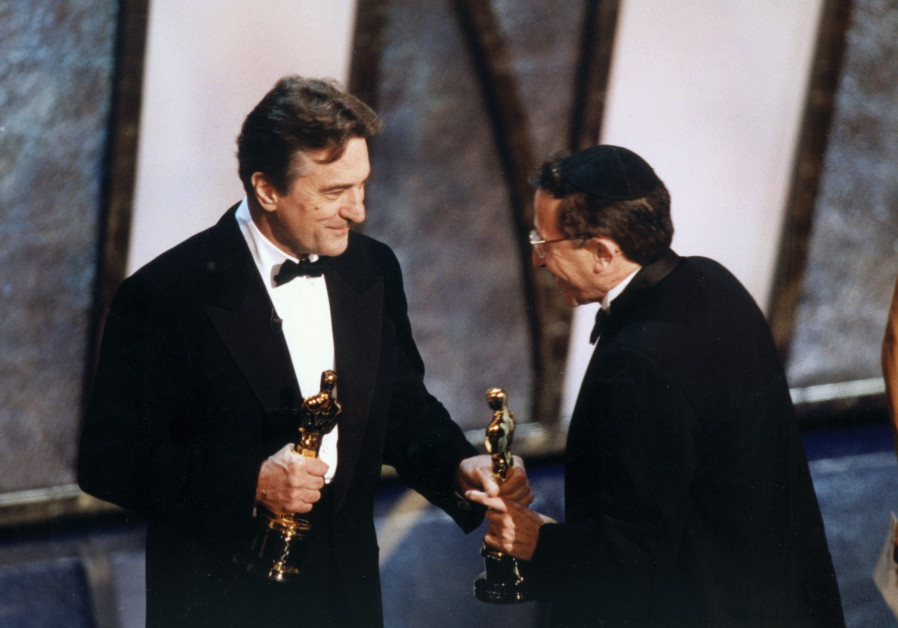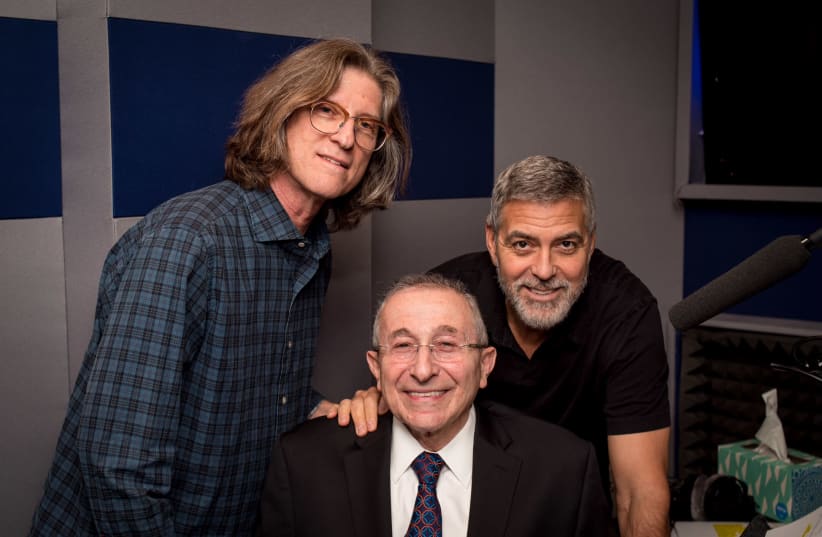There are almost 8,000 people who are eligible to vote for this year's Academy Awards. But only one of them is a rabbi.
So says two-time Oscar winner Rabbi Marvin Hier, who has been a member of the Academy of Motion Picture Arts and Sciences since he nabbed his first golden statue almost 40 years ago.

Visiting Jerusalem just a day before voting opened for the 2019 Academy Awards, slated for this Sunday in Los Angeles, Hier sat down with The Jerusalem Post to discuss Oscar voting, politics, and the long, storied connection between Hollywood and the Simon Wiesenthal Center he founded in 1977.
The 80-year-old Orthodox rabbi and product of the Lower East Side might not be your typical Oscars voter. But he takes the job seriously.
"All the academy members watch all of the films from beginning to end," Hier said. Or, at least they're supposed to. "It's not fair to do it - to watch a film for five minutes," he said. "In the interest of fairness, you have to watch [them all the way through]."
Such a commitment can add up to a huge chunk of time, he said, which is why he's had to limit himself to certain categories: the documentary features and the general features.
"Last year, I had more time, so I did shorts as well," Hier said. But he sits out voting on the foreign films, and the animated features. "It's too much for me to do - I wouldn't take an obligation that I don't have time to do." And he said he doesn't think he's skipped a year of voting once since 1982: "I make it a point not to miss."
Hier isn't allowed - by Academy regulations - to share his picks or favorites for this year's Academy Awards. But it is clear that certain films left an outsized impression.
"There are a lot of great films and they were on subjects that were outside of the United States," Hier said. "There were two or three that were really outstanding - talking about issues globally, not only issues in the United States. I thought that was a change from the previous years."
Two of the films in the best picture category this year - Roma and The Favourite - are set outside the US. The Polish historical drama Cold War is nominated for three awards, including best director.
"I wouldn't say that this is the best year for film," Hier said candidly. "There were years that there were better quality films."
Still, he said, four movies really stood out for him from among the crowded field: the documentaries RBG and Of Fathers and Sons, and the best picture nominees Black Panther and Bohemian Rhapsody - which Hier called "very, very interesting."
RBG tells the story of Supreme Court Justice Ruth Bader Ginsburg, who grew up in a first-generation Jewish American family in Brooklyn.
"There's a lot of talk about Ruth Bader Ginsburg and what's going on with her now, the fact that she's in the hospital and surgery and all that," said Hier. "But the film itself - and what she did for the women's movement - is unbelievable."
GROWING UP on the Lower East Side in the 1940s and 50s, Hier never once dreamed of the life he would lead, embraced by Hollywood and deeply entrenched among Hollywood's power elite.
But some key encounters in the late 1970s, as Hier was first setting up the Simon Wiesenthal Center, set him on this path.
Before the center had even opened at all, Hier recounts, a woman came to visit their fledgling operation inside a Jewish high school also founded by Hier.
"We had the story of the Shoah in a slide projector - we had about 24 lined up, and visitors couldn't walk in front of them," said Hier. The woman implored the rabbi to ditch the projector setup, and told him: "If you want to tell the story of the Holocaust, why don't you do a film?"
That woman was Fay Kanin, the president of the Academy of Motion Picture Arts and Scientists. And the movie became Genocide, the 1981 film about the Holocaust narrated by Elizabeth Taylor and Orson Welles that won the Oscar for best documentary feature.
Hier went on to found Moriah Films, the film division of the Simon Wiesenthal Center, which also produced the Oscar-wining 1997 documentary The Long Way Home, narrated by Morgan Freeman, about Jewish refugees emigrating to Israel after the Holocaust. Its latest and 16th film, Never Stop Dreaming: The Life and Legacy of Shimon Peres, directed by Richard Trank, will be released later this year. And Trank and Moriah are currently working on a still-untitled feature documentary about David Ben-Gurion.
But Hier traces a lot of the center's wide success to a phone call he received in the late 1970s from Mickey Rudin - the lawyer for Frank Sinatra. Rudin told Hier to wait in his office for the legendary crooner to be in touch about supporting the center.
"[Sinatra] called and he couldn't have been nicer," Hier recalled. "He invited me to his home in Palm Springs... he introduced us to everyone in Hollywood. He became a member of our Board of Trustees and a generous supporter of the Simon Wiesenthal Center."
Today, the center's Board of Trustees includes Jim Gianopulos, the chairman and CEO of Paramount Pictures, Jeffrey Katzenberg, the former Disney chairman and co-founder of Dreamworks, Ron Meyer, the vice chairman of NBCUniversal and Sid Sheinberg, the former president of Universal Studios. The center's films have been narrated by George Clooney, Sandra Bullock, Nicole Kidman, Michael Douglas, Patrick Stewart and many more.
"And it all started from Frank Sinatra," Hier said. "The Simon Wiesenthal Center is fortunate that the leaders in Hollywood - those who are very left, those are more moderate, and the few that are on the Republican side - they have all been members, supported the work of the Simon Wiesenthal Center against antisemitism and bigotry."
But that doesn't mean Hier wasn't the subject of intense criticism in 2017, when he accepted an invitation from US President Donald Trump to speak at his inauguration. Two years later, the rabbi stands by his decision, and says he was not swayed by any of the denunciations.
"Some people didn't like it, but I responded to them," he said. "I said look, I was only doing the right thing, the same thing that Barack Obama and his wife did, the same thing that Jimmy Carter and his wife did, the same thing that the Bushes and the Clintons did - which was they showed up at the inauguration." Hier said that he never dreamed of turning down the invitation, and passing up the opportunity to be "the first Orthodox rabbi in the history of the inauguration."
Hier was only mildly critical of the current president, saying he would "tell him to quit the tweeting," but that "presidents are human beings - they make mistakes, we all make mistakes." Two years into his presidency, Hier's most serious criticism of Trump is still centered on the comments he made after the Charlottesville neo-Nazi rally in 2017.
"Charlottesville was terrible, and what President Trump said was not correct, you can't compare the two sides, it's ridiculous," he said. "But at the same time, today, you have for example the progressive left who are out of their minds - some of the things they say are off the wall."
But Hier said the center only speaks up when it feels it must do so to aid its mission.
"The Wiesenthal Center has spoken out against Democratic presidents, Republican presidents, but it's not our job, we're not a political organization," he said. "We have to do that dance correctly, which is to speak out when it affects our agenda; when it doesn't affect our agenda we don't speak out."
